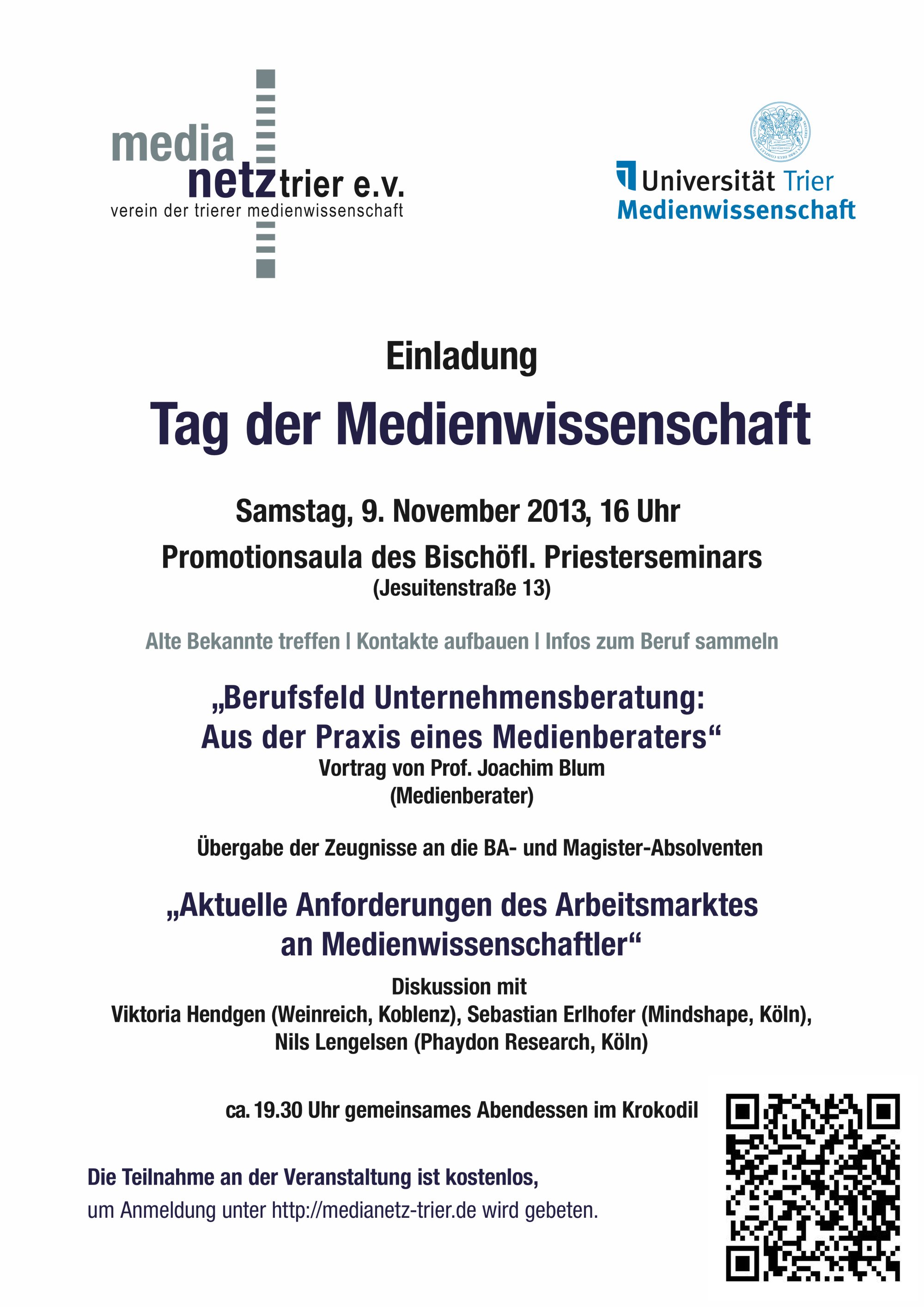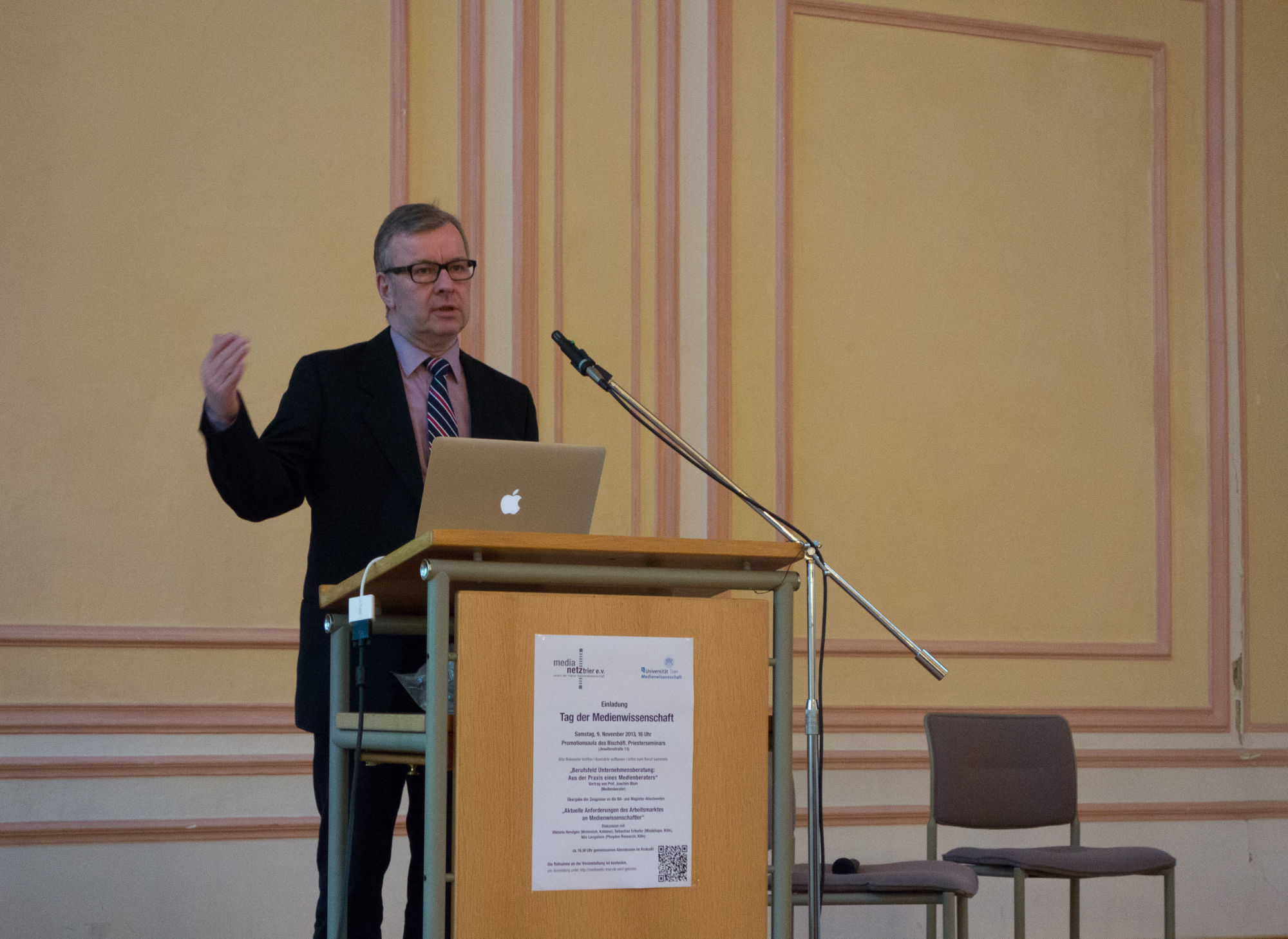Joachim Blum on his experiences as a media consultant Digital media shift as a challenge for editorial staff and media studies
The digital media shift is a challenge for all of us, whether we are part of the editorial staff or media studies in general. Thus, this was one of the major topics of the day of media studies in 2013. Joachim Blum held a keynote covering his experiences as a media consultant, and the alumni Viktoria Hengen, Sebastian Erlhofer, and Nils Lengelsen spoke about what the job market expects from students of media studies.
Joachim Blum: Nine observations of a media consultant

Joachim Blum's keynote had the striking title "The daily business of a media consultant", and as the focus of his consulting activities suggests, he concentrated on the special challenges of journalism. Sinking numbers of readers are a huge challenge for publishers: Ever more channels of publication lead to growing complexity, which is part of Joachim Blum's daily business. He summarized his observations in nine points:
- Structured planning is necessary: Publishers are defining projects including analyses of the situation, goals, milestones, costs, risks, and opportunities. In order to integrate all these aspects, there is a need of good project management.
- Traditional processes of work are maintained: Analyzing the current work processes is the first step, although this is unusual business for newspapers. Workflows are often oriented towards production with a fixed editorial deadline. However, modern workflows are process oriented without a defined deadline.
- Overcoming the fear of integrated organizations: There is a need of constant communication of all involved members, but in editorial contexts, this idea is still regarded with timidity. For example, he mentioned the news room of the Daily Telegraph, which is still judged negatively.
- Models are taken over without reflecting them: However, sometimes publishers fall into a kind of actionism. In these cases, models are taken over without reflection because they have been successful in different companies.
- Managing people: It is also necessary to build skills of managing people. These skills are indispensable for editors-in-chief besides their journalistic skills.
- Accumulated needs in the development of personnel: Publishes need to invest early and continually in the education of their staff if they want to be able to react to the rising challenges. Joachim Blum mentioned the role model of the local newspaper Trierischer Volksfreund, which focused early in the qualification of their staff.
- Managing change processes: Joachim Blum found that processes of transformation in editorial contexts often suffer from problems of internal communication.
- Market research not taken serious enough: Although market and reception research can provide valuable insights and guidelines about needs and solutions, they are not taken serious enough by publishers.
- Invest in good technological infrastructure for modern communication: While modern publishers like Springer integrate developers in their editorial teams, other publishers still rely on old content management systems (CMS) and information technology (IT). However, only a close collaboration of people with different skills can cope with the convergence of network media.

Despite these deficits, Joachim Blum was not too negative. Publishers are open-minded, meaning newspapers can still be rescued. Publications with monopoly positions in particular, targeting a small group of readers, will survive for a long time.
Obviously, the discussion also included one of the major topics in publishing today: "Is there a chance for paid content on the web?" Joachim Blum had a couple of interesting observations to share. Paid content can thus work, but not for ordinary media. He mentioned the New York Times as an exemplary case and also referred to the paid content experiments of Springer, although it is still too early to draw conclusions. However, the trend is clear: Publishers are increasingly unwilling to give content away freely, moving toward a brand subscription, offering the reader access to all contents for a fixed price. Special interest publishers like Test are already using this model successfully.
Panel discussion: "What does the job market expect from students of media studies?"
Like in the previous years, three alumni participated in the discussion, moderated by Michael Harnischmacher: Sebastian Erlhofer (mindshape), Viktoria Hendgen (WeinReich), and Nils Lengelsen (Phaydon Research).

What do alumni of media studies actually do?
The first part covered the question of which kind of jobs are available for alumni of media studies. What does the daily work look like? The answer once again showed the range of possibilities that studying "something with media" offers:
- Viktoria Hendgen said that there is not "the typical daily work". Her activities cover the whole range of marketing, including print and online, with a particular focus on social media. Additionally, tourism networks, working with journalists, fairs, …
- Nils Lengelsen explained that his daily work in research is similar to the university. He analyzes how people are using web sites, apps, and devices. Ideally, this leads to concrete suggestions for actions, but – different than during studies – the opinion of users is not the only criterium. For example, users often object to advertising on web sites.
Networking is also important to find a way into work life, as Nils Lengelsen explained. In his case, a friend suggested applying for his job, thus opening the door. And how do you succeed in transitioning from media to wine, like Viktoria Hendgen did? "My love of wine led me to where I am today, in particular during an internship."
Sebastian Erlhofer, who is directing the agency mindshape, took a different path. He started with the studies of computer science in 2000, where he also met the second managing director of mindshape. In 2002, he switched to media sciences, but kept working independently. "I grew up with Google", he explains, which eventually led to the writing of the German book "Suchmaschinen-Optimierung: Das umfassende Handbuch", one of the classics on search engine optimization on the German market.
His daily work in the agency often means growing the sales of small and mid sized enterprises via online marketing or search engine optimization. Empirical and statistical methods guide him to find the right key words. In order to maintain an advantage in knowledge, his company invests a huge amount of its time in A/B testing, using multivariate tests to assess various measures.
Which aspects of the studies proved important, and which were missing?
Students in seminars or lectures often have troubles imagining how the content shall help them in their job. "For me, the many practical experiences were important, especially regarding eye tracking", Nils Lengelsen explained. "This was a good foundation. Many of the contents itself are not very relevant any more, but the tools and abilities help – for example how to deal with qualitative data. Daily work shows most of that."
Viktoria Hendgen mentioned the range of topics in particular. However, she acquired most of her technical knowledge during a crash course in parallel to her exams. Preparing and giving presentations also helped a lot.
Sebastian Erlhofer also stressed the culture of giving presentations as something often required in the daily work. Logics of media, taken from media history, can also be applied to the internet. "But it is also about taking the initiative", the director of mindshape told, for example in project management. It is important to specialize and experiment a lot, but also to know tools like Office. With these abilities, students of media studies are well prepared for a job.
What is the role of media shift in the daily work?
„And now for an academic question…“, Michael Harnischmacher introduced one of the topics which media research and education covers the most: the digital media shift. All panelists agreed that this shift has already taken place. It is more of an evolution and a revolution at the same time, with each day bringing something new. "During daily work, it is not about thinking about media shift, but about doing", as Viktoria Hendgen pointed out. "And about constant adjustments."

 6 minutes estimated reading time
6 minutes estimated reading time 